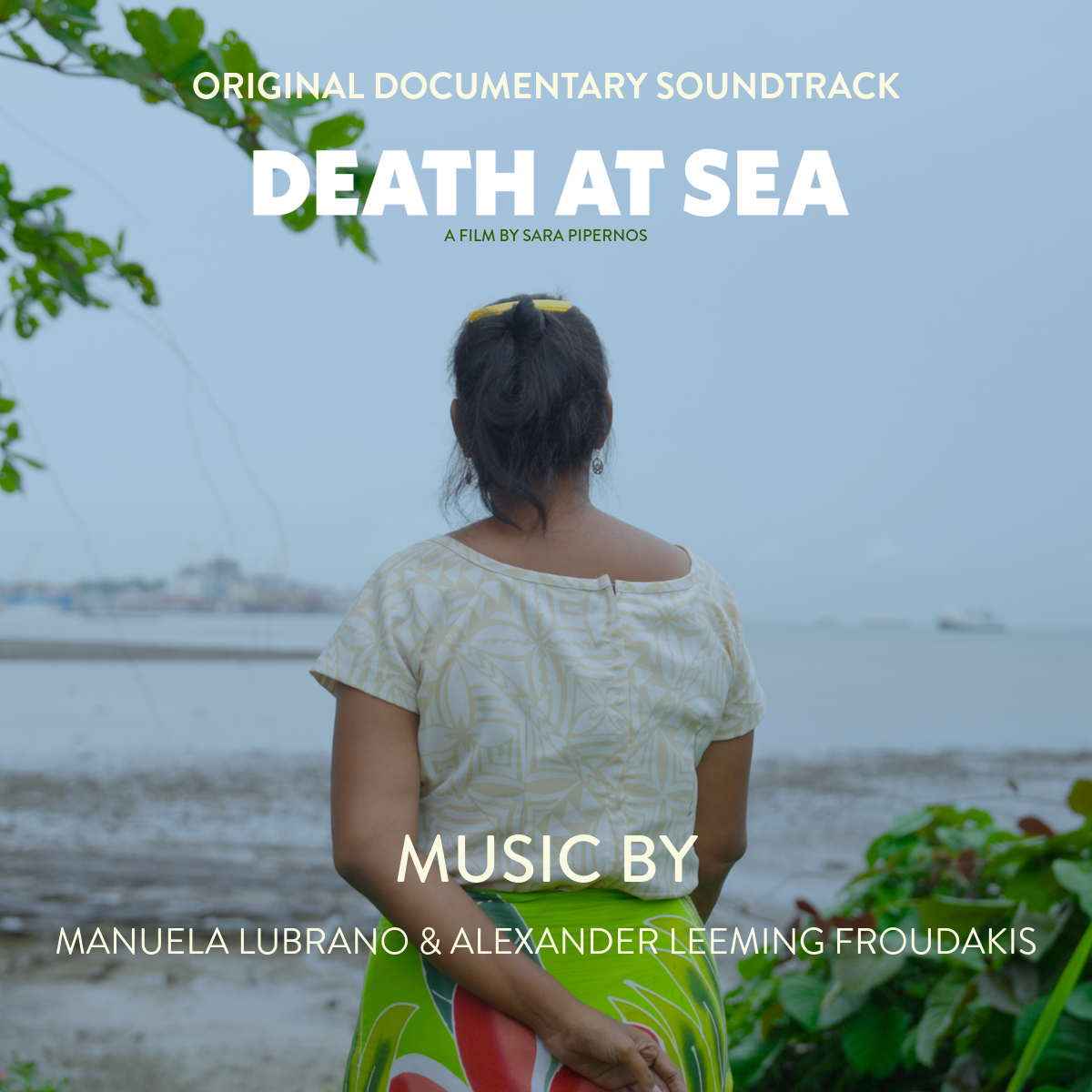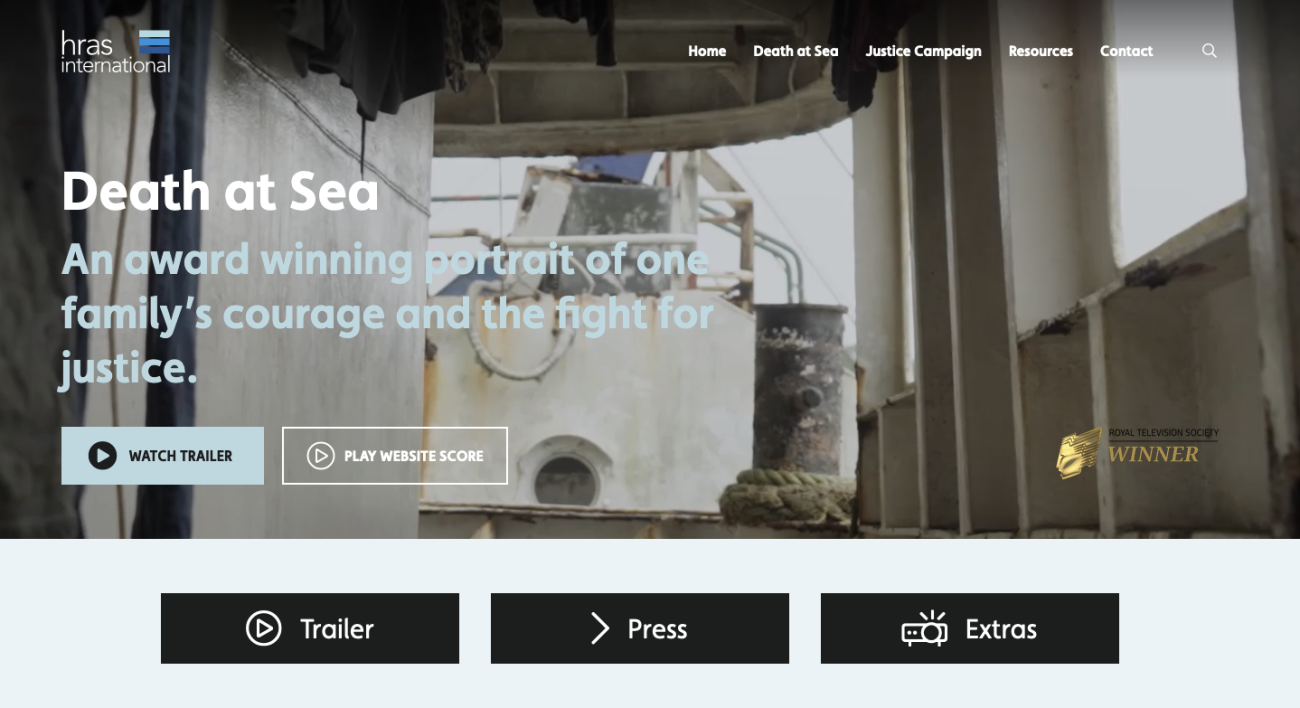Human Rights at Sea International is pleased to introduce and showcase the skills of the student BAFTA award-winning composers responsible for adding the audio impact to the Death at Sea film.
In an exclusive interview with Manuela Lubrano and Alexander Leeming Froudakis, we are delighted to share both composers personal and professional insights into the unique music they create for wide-ranging projects including our own Death at Sea film directed by Sara Pipernos.
The music of the website is now available and the full score from the film will be shortly available on Spotify.

Our Goal
As composers, our goal is to use our musical talents to tell the unheard stories and address real-life matters that deeply affect individuals and communities. We believe that music has a profound ability to evoke emotions, foster empathy, and inspire action. Music acts as a common language, connecting people across different backgrounds and cultures. When collaborating with filmmakers, our approach is to
truly understand the director's vision and the people on screen. We draw inspiration by internalizing their emotions, pain, and joy, allowing us to express these feelings through music. Ultimately, our goal is to connect and collaborate with people to work towards a better future.
The Score
The score mainly features electronic-ambient textures accompanied by strings and piano, aiming to mirror the emotional depth and significance of the documentary's subject matter. It also includes subtle elements such as guitar and panpipes that give us a sense of the location (Fiji) combined with manipulated boat sound design. There are four main themes throughout the score.
Eritara's Theme (or Love Theme)
This theme is characterized by an uplifting and nostalgic melody. It comes in every time Tekarara speaks of Eritara or reflects on their shared memories, aiming to capture her love and cherished moments they had. The music subtly shifts from major to minor tones, mirroring the bittersweet nature of her recollections - filled with both the joy of their past and the sorrow of their present separation. This theme is heard in the intro but more prominently during the scene where Nikki and Tekarara look at pictures, with the use of guitar.
The Call Theme (or Grief Theme)
Marking one of the most heart-wrenching moments in the documentary, this theme accompanies Tekarara as she narrates receiving the devastating news of Eritara's passing. The music uses string textures and loght electronics with a somber tone, aiming to capture the overwhelming pain of the moment and the profound injustice of the situation. The slow build of tension, leading to a haunting boat horn, aims to reflect Tekarara’s profound grief and the tragedy of losing a loved one.
Hypertension Theme
This theme aims to reflect the vulnerability faced by fishery observers who have tragically died at sea and the ongoing risks they still face. The music predominantly features a steady pulse combined with the lower register of the cello, providing melancholic tones and a sense of heaviness, as well as ambient vocals and light electronic elements. The melody rhetorically simulates the rocking of a boat at sea. The combination of these musical elements aims to draw attention to the human cost of these covers up and the urgent need of a voice for justice and accountability.
Isa Lei
Composed in 1916 by Ratu Tevita, "Isa Lei" is a traditional Fijian farewell song. Its inclusion in the documentary serves as a poignant farewell to the loved ones lost at sea and a tribute to the Fijian people and their culture. Our rearrangement is entirely a cappella, highlighting the power of the human voice and the importance of speaking out. The absence of instrumentation aims to create an intimate moment, encouraging the audience to reflect deeply on the story they just witnessed.
Background
Alexander is a British/Greek Music Producer, Sound Artist, and Visual Media Composer based in Bristol, UK. His musical journey began from the early age of 5 on a piano, leading to a decade of refining his skills as a classical pianist. Alexander's passion for creative production and experimental audio later prompted him to pursue a BA in Music Production & Sound Engineering at the dBs Music Institute in Bristol, where he was nominated as standout graduate student during the final year of his tuition. Continuing his academic pursuit, Alexander earned an MA in Music Composition for Film & TV where his passion really lies at Bristol University. Alexander specializes in audio-visual media, composing music for short films, TV, trailers, surround installations, string quartets, and commercials with work of his featured on reputable channels such as the BBC, National Geographic, and Amazon Prime. His string arrangement of Beyoncé’s Deja Vu was prominently featured in the Netflix show 'Queen Charlotte: A Bridgerton Story.' Noteworthy collaborations include working alongside film composer Neil Davidge, contributing as an arranger and additional scene writer in episodic series such as ‘All or Nothing ft Tottenham Hotspur’, ‘Britannia Season 3’, ‘Earths Great Rivers’ and Earth ‘Moods’. Alexander's most recent work delves into the realm of documentaries, 'When The Floods Come,' ‘Death At Sea’ & Attack On Sorpe Dam.
Manuela Lubrano is an Italian Media Composer based in Bristol, UK. She specialised in scoring films that address significant topics such as climate change, human rights, and social issues. Manuela believes that it's part of her professional responsibility to actively contribute to the community by using skills to raise awareness. In 2023, during her Master's degree in Music composition for film & TV at the University of Bristol, Manuela had the opportunity to re-score one of The BBC's wildlife scenes, "Fierce Queen - Love Trap", collaborating with BBC producer Tuppence Stone. She was also taught from professional composers William Goodchild and Tess Tyler and honed her skills in advanced orchestration under John Pickard and music production under Jonathan Scott
Manuela is now the in-house composer at Human Rights at Sea International and Jungli Films Company and has partnered with Alexander Leeming Froudakis. Her debut work includes contributions to the documentaries When the Floods Come and Death at Sea, in collaboration with Human Rights at Sea and Human Rights at Sea International. She is also the creator of Art Comes Alive, an art exhibition where painters create live art inspired by the music written by her and other selected composers. With a hidden thematic element in each piece of music, her aim is to engage audiences, encouraging reflection and utilising music and art as a therapeutic medium.
Review the Death at Sea Justice Campaign

ENDS.
Source: Alexander Leeming Froudakis, Manuela Lubrano
Photo credits: Alexander Leeming Froudakis, Manuela Lubrano
Contact: If you have any questions, please write to us at enquiries@hrasi.org.
About Sharing. We welcome the use and dissemination of our copyrighted work with full, accurate and proper accreditation.
